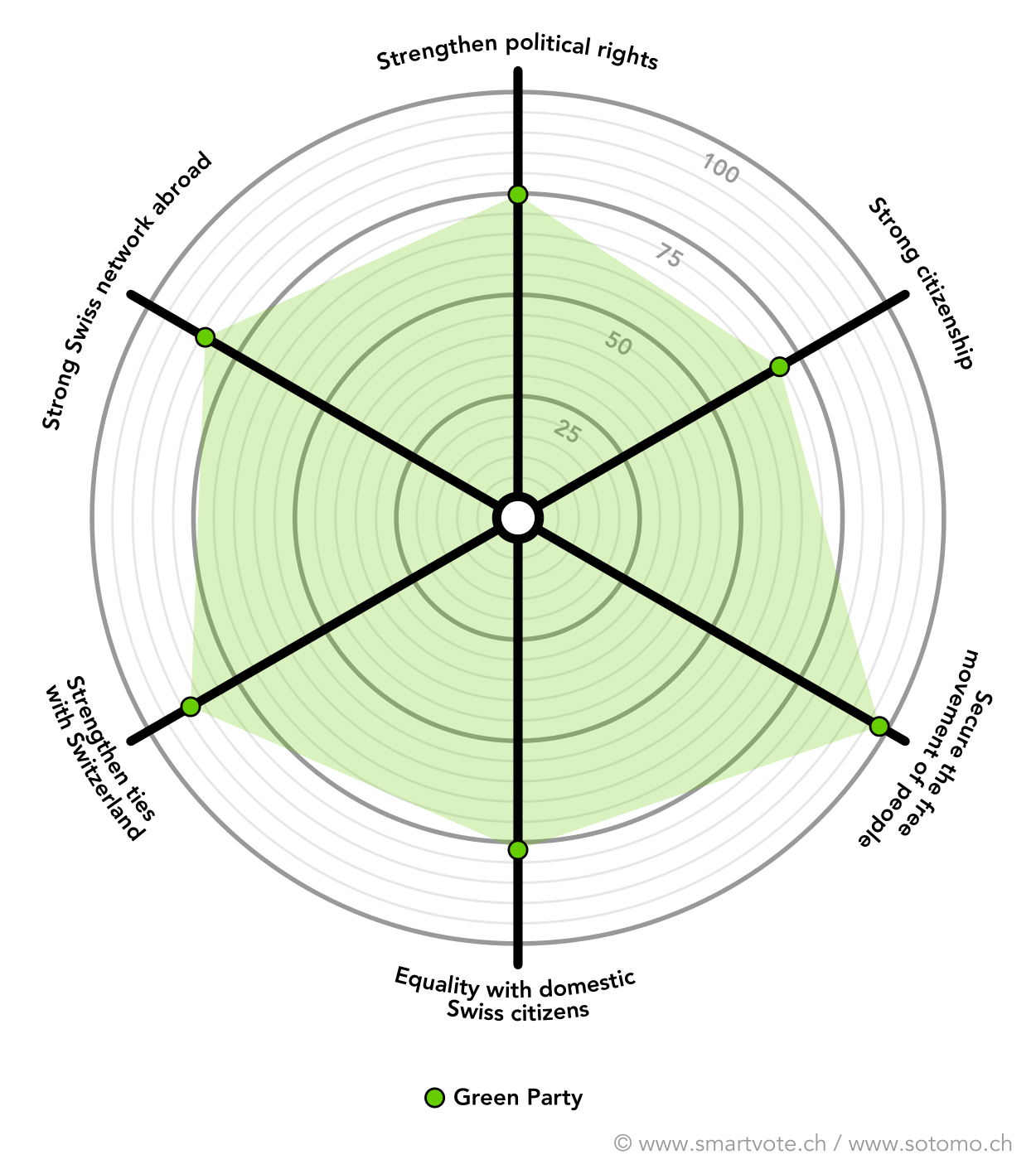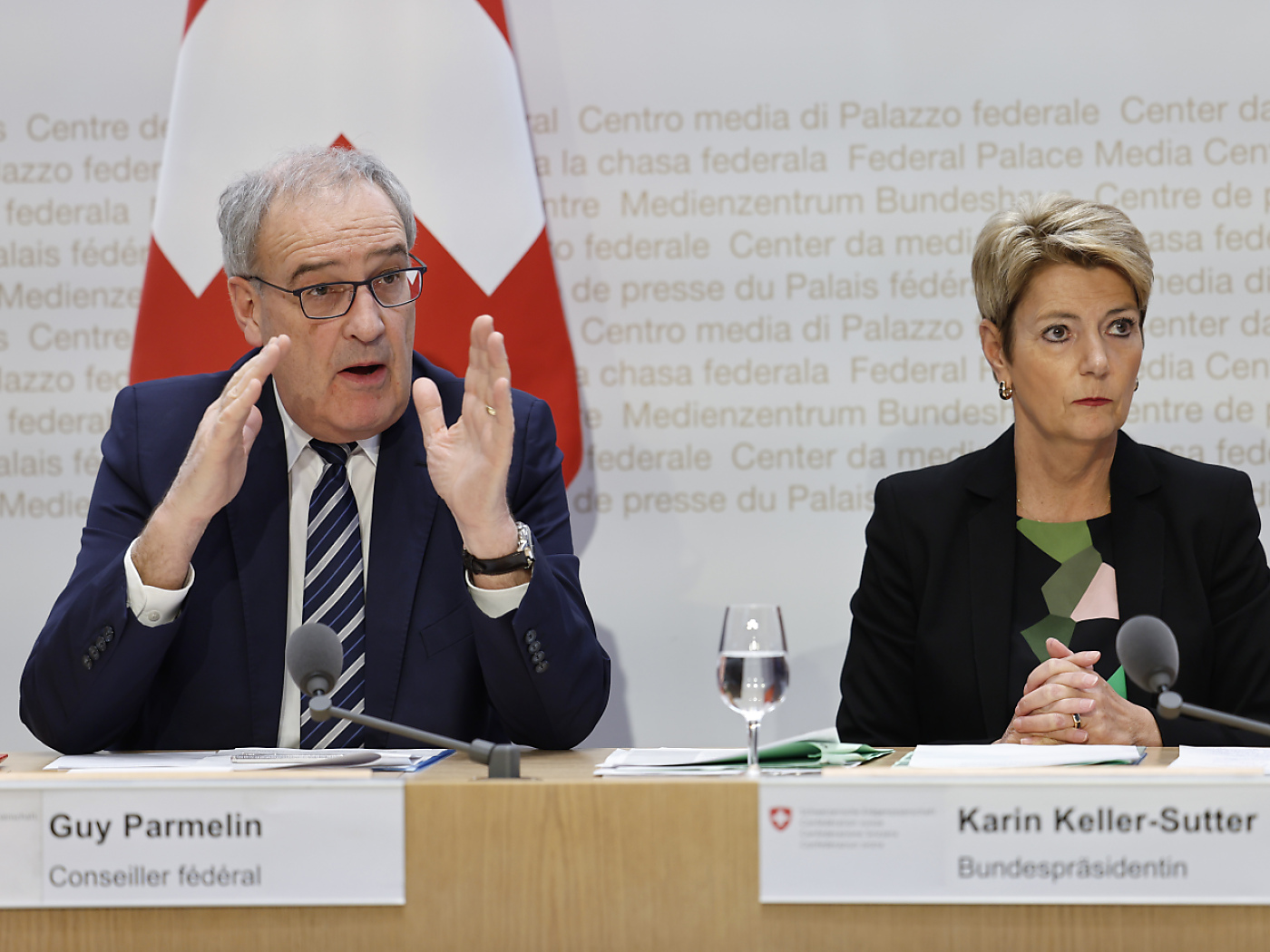The Greens: a party with a global vision

Like the Swiss Abroad, the Swiss Green Party thinks globally. It is, for instance, committed to good relations with the European Union (EU), as Green Party secretary Rahel Estermann explains.
Until now, the Swiss Green Party has had no international section. However, with an eye on the federal elections in the autumn, the party has decided to set one up, called International Green Network, says the party’s secretary general, Rahel Estermann.
The party feels connected to the Swiss diaspora. Several party members live abroad, especially in the border regions. In the canton of Geneva, cross-border commuters will run as candidates in the October 22 elections. The party advises its cantonal sections to be open and to encourage Swiss living abroad to run as candidates.
- Swiss Green Party
- Year founded: 1983 (The Green Party was founded as a national party in 1983. However, ecologically oriented parties and electoral groupings had already been active in various cantons since the early 1970s)
- Mergers: Over the course of time, different cantonal parties have repeatedly come together under the umbrella of the Swiss Green Party – for example, the Green Free List from the canton of Berne, BastA! from the canton of Basel-Stadt and the Alternatives from the canton of Zug
- President: Balthasar Glättli (Senator from Zurich)
- Number of members: approx. 13,000 (in 2022)
- Share of seats in parliament:
- 30 seats in the House of Representatives (15%)
- 5 seats in the Senate (10.8%)
- Proportion of women in parliament: 75%
- Political positioning – three core concerns:
- For a healthy environment and the protection of natural resources, especially the climate
- For a Swiss foreign policy that actively and consistently seeks to promote peace and human rights
- For gender equality and equality of gender identities and the fight against all forms of discrimination. (SRF)
Direct representation in parliament for Swiss living abroad is not one of the party’s priorities.
According to Estermann, the Greens are making efforts to be accessible to citizens abroad: “We launched an online consultation on our election programme in which everyone could participate, including the Swiss Abroad”.
A global vision
“Our party has a broader view of life than others. This is a strength we share with the Swiss diaspora,” Estermann says. The climate, which remains the party’s main concern, is a global challenge for which solutions must also be found at the global level, she adds.
Estermann believes that there are issues today that can no longer be addressed within national borders. One of these is the question of citizenship. For example, “we see no problem in the Swiss Abroad being able to pass on their citizenship beyond the third generation,” she says.

Improving Swiss-EU relations
In addition to environmental issues, “relations with the EU are one of our priorities”. Around 60% of the 800,000 Swiss Abroad live in an EU country.
The Greens, together with the Association of Swiss Student Bodies, supported the movement Operation Libero in launching the so-called Europe Initiative. This essentially seeks to anchor European integration in the constitution and calls on the government to organise institutional matters in a way that strengthens links with Europe.
For Estermann, the erosion of relations between Bern and Brussels, while too slow to have an impact on everyday life in Switzerland, is nevertheless dangerous. It is leading, for example, to problems in research programmes, especially at the university level.
“In the long term, it could also have a considerable impact on freedom of movement, directly affecting the hundreds of thousands of Swiss living in the EU,” she cautions.
The party is advocating for the introduction of electronic identity, which would make it easier for the Swiss diaspora to access state services.
E-voting must not be a business
The Greens are aware that e-voting is an issue for the Swiss Abroad. “But we also believe it’s important that this be regulated by the state,” Estermann says. “We object to the idea of the post office profiting financially from e-voting.”
She fears that the public could lose trust in poll results if the solution is not fully sponsored by the state and secure, and that “this could create a situation like that in the United States”, where part of the population doubts election results.
The party therefore favours introducing e-voting in test phases for those who need it most, such as the Swiss Abroad and people with disabilities, she says.
Strengthening democracy
The Greens believe that the higher the number of citizens who take part in voting, the stronger a democracy is. For this reason, it contends that Swiss citizens living permanently abroad should be able to exercise their right to vote.
The party also supports lowering the voting age to 16 and the initiative to facilitate access to citizenship. “We believe that this will further strengthen democracy”, Estermann says.
“The basis of democracy is access to independent information,” she adds. The party is therefore in favour of government support for media targeting the Swiss Abroad. It is also in favour of networks abroad to promote Swiss culture and entrepreneurship, such as swissnex or Swiss schools abroad, “provided they are not sponsored by private companies with other interests”.
No obligation for the banks
The Greens are aware of the difficulties faced by the Swiss Abroad in connection with bank accounts. “But it is impossible to oblige these private institutions to offer the same services to the diaspora as they do to Swiss nationals at home,” says Estermann.
As far as the issue of social insurance is concerned, the party would “tend towards favouring” allowing the Swiss Abroad to keep their health insurance in Switzerland, such as if they leave the country for a limited period of time. “But that would have to be examined in detail,” she says.
+ Climate Protection Act: In June 2023, the Climate Protection Act won a clear majority in a referendum. The Greens were strongly committed to this legislation, which came about as a counter-proposal to the Glacier Initiative – both in parliament and in the referendum campaign.
+ Greens in cantonal governments: Greens in governing positions are no longer exotic. Green members of various cantonal governments have gained recognition for their work. Christine Häsler in Bern and Martin Neukom in Zurich, for example, were re-elected to their posts with comfortable margins; in the canton of Fribourg, Sylvie Bonvin-Sansonnens entered the government for the first time. (SRF)
– Failed environmental bills: June 13, 2021 was a bitter day for the Greens. The CO2 law was rejected at the ballot box, as were the pesticide and drinking water initiatives. All these failed proposals were about core Green concerns.
– Failed candidacy for the government: After their great electoral success in autumn 2019, the Greens laid claim to a seat on the government and put forward a high-profile candidate in the form of the party president at the time, Regula Rytz. However, she did not stand a chance in parliament. (SRF)
Election issues and goals
A new dawn for the climate: The Greens are demanding that climate protection be prioritised in all areas. It’s calling on the Swiss financial sector to finally start operating sustainably. In addition, the party is urging comprehensive subsidies for renewable energies and a transport policy focussed on public transport and bicycle paths.
Promoting biodiversity: The Greens are fighting growing urbanisation. They say it will result in the loss of valuable natural and cultural spaces. They are also calling on farmers to abandon the use of synthetic pesticides.
For a society without discrimination: All people should be able to develop freely, regardless of sexual orientation, gender identity, ethnic origin or a disability. The fight for marginalised groups is fundamental to the Green Party’s mission. (SRF)
Starting position and prognosis
The Greens are currently facing headwinds. Polls predict that they will lose votes, and they have already forfeited seats in various recent cantonal elections. Although environmental and climate issues remain important in the public debate, the problem of global warming is no longer the top priority for many people as it was in 2019.
Under these conditions, it is difficult for the Green Party to equal its result of four years ago (a 13.3% share of the vote). It remains to be seen whether the Greens will succeed in cushioning the feared losses somewhat, by scoring points again with their climate policy after a dry, hot summer. (Elmar Plozza, SRF)
Edited by Samuel Jaberg. Translated from German by Catherine Hickley/gw

In compliance with the JTI standards
More: SWI swissinfo.ch certified by the Journalism Trust Initiative














You can find an overview of ongoing debates with our journalists here . Please join us!
If you want to start a conversation about a topic raised in this article or want to report factual errors, email us at english@swissinfo.ch.